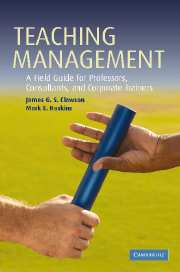Book contents
- Frontmatter
- Contents
- List of figures
- Sources to chapter quotations
- Why this book on teaching management?
- 1 Fundamental elements in teaching
- 2 Levels of learning: one, two, and three
- 3 Adult learning theory: it matters
- 4 Planning a course: trips and tips
- 5 Planning a class: no detail is too small
- 6 Lecturing: the possibilities and the perils
- 7 Managing discussions
- 8 Case method: fostering multidimensional learning
- 9 Role-playing
- 10 Case writing: crafting a vehicle of interest and impact
- 11 Case teaching notes: getting from here to there
- 12 Action learning
- 13 Experiential methods
- 14 Enhancing the conversation: audiovisual tools and techniques
- 15 Executive education: contributing to organizational competitive advantage
- 16 Using technology to teach management
- 17 Counseling students
- 18 Evaluating students: the twin tasks of certification and development
- 19 Teaching evaluations: feedback that can help and hurt
- 20 Research presentations
- 21 Managing a degree program: behind the ‘glory’
- 22 Managing a nondegree client program: an overview
- 23 Dealing with the press
- 24 Managing yourself and your time
- 25 Using teaching portfolios and course portfolios
- 26 Conclusion: is this on the exam?
- Index
17 - Counseling students
Published online by Cambridge University Press: 25 February 2010
- Frontmatter
- Contents
- List of figures
- Sources to chapter quotations
- Why this book on teaching management?
- 1 Fundamental elements in teaching
- 2 Levels of learning: one, two, and three
- 3 Adult learning theory: it matters
- 4 Planning a course: trips and tips
- 5 Planning a class: no detail is too small
- 6 Lecturing: the possibilities and the perils
- 7 Managing discussions
- 8 Case method: fostering multidimensional learning
- 9 Role-playing
- 10 Case writing: crafting a vehicle of interest and impact
- 11 Case teaching notes: getting from here to there
- 12 Action learning
- 13 Experiential methods
- 14 Enhancing the conversation: audiovisual tools and techniques
- 15 Executive education: contributing to organizational competitive advantage
- 16 Using technology to teach management
- 17 Counseling students
- 18 Evaluating students: the twin tasks of certification and development
- 19 Teaching evaluations: feedback that can help and hurt
- 20 Research presentations
- 21 Managing a degree program: behind the ‘glory’
- 22 Managing a nondegree client program: an overview
- 23 Dealing with the press
- 24 Managing yourself and your time
- 25 Using teaching portfolios and course portfolios
- 26 Conclusion: is this on the exam?
- Index
Summary
“Be yourself!” is about the worst advice you can give to some people.
– Tom MassonNo matter how well credentialed and trained psychotherapists may be, if they cannot extend themselves through love to their patients, the results of their psychotherapeutic practice will be generally unsuccessful. Conversely, a totally uncredentialed and minimally trained lay therapist who exercises a great capacity to love will achieve psychotherapeutic results that equal those of the very best psychiatrists.
– M. Scott Peck, M.D., The Road Less TraveledYou're sitting in your office when a student nearing graduation comes in with the news that his best friend and classmate has just been killed in an automobile accident. He seems confused, on the verge of tears, and not sure what to do. He obviously wants to talk.
A student enters your office in tears; the probable grade of C in your course would mean failing out of graduate school and severe shame before family members.
Citing “personal problems” and “pressure” as her reasons, a bright, promising student in your class comes to your office and announces her intentions to leave school midway through the first year.
A student who has hardly talked at all during the semester comes in to your office, sits down, and says, “I'm not sure why I'm here, but you seem like the person to tell. I've just learned that my fianc'e has cancer.”
An executive education program participant says he can't stand his boss, but can't quit his job.
- Type
- Chapter
- Information
- Teaching ManagementA Field Guide for Professors, Consultants, and Corporate Trainers, pp. 304 - 322Publisher: Cambridge University PressPrint publication year: 2006



